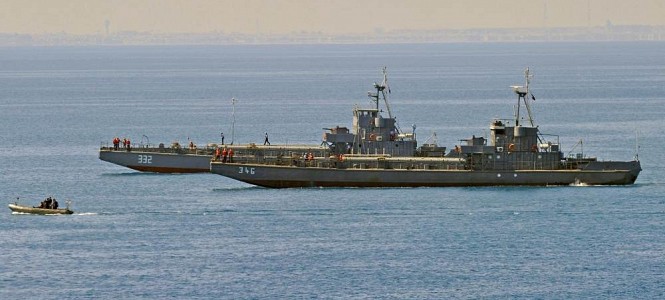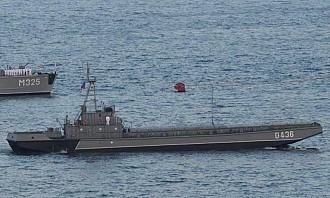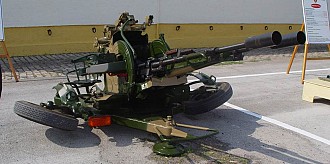Ships / Landing ships / Vydra class
Vydra class
General Facts
- TYPE
Landing craft utility - ORIGIN
 USSR
USSR - NICKNAMES
Project 106 (built in USSR)
Project 106K (built in Bulgaria) - DESIGNED
Late 1950's - DESIGNER
Unknown - PRODUCTION
1967 - 1969 (USSR)
1975 - 1978 (Bulgaria) - PRODUCERS
 Bulgaria
Bulgaria
 USSR
USSR - QUANTITY
About 50 built in USSR, plus 13 in Bulgaria - UNIT COST
Unknown - CHARACTERISTICS
 Good cargo capacity
Good cargo capacity
 Poor rough sea capability
Poor rough sea capability
 Most are unarmed
Most are unarmed
Introduction
The Vydra is a class of landing craft of Soviet origin. The Vydra was designed in the 1950's as a landing craft with secondary cargo carrying capacity. The design is based on the German World War 2 era MFP class, some of which were captured by Soviet forces.
Layout
The Vydra has a conventional design with a ramp at the front, cargo area in the middle and superstructure and engine compartment at the rear. For full continuous wartime service a crew of 20 is carried. Standard day jobs can be carried out with less. The capacity consists of 200 tons of cargo or three tanks or 100 troops.
Firepower
Most Vydra were unarmed. Some were fitted with two 23mm ZSU-23-2 at the front of the superstructure. During the 1973 Yom Kippur war many Egyptian Vydra were fitted with two twin 37mm M1939 anti-aircraft guns. Both the ZSU-23-2 and M1939 are anti-aircraft guns that can also be used against ground targets during landing operations, hence their forward facing position. In 1993 five Bulgarian units were converted to minelayers.
Electronics
For navigation purposes there is a basic radar system. An IFF system was fitted to most of the class. There is no automated fire control.
Mobility
Vydra landing craft are fitted with two diesel engine delivering 600 hp and powering two shafts. The maximum speed is 12 kt and the range is 2.500 nm at a speed of 10 kt. Due to their design the seagoing capability in rough weather is limited.
Users
About 60 Vydra have been built. About half of them were used by the Soviet navy. Many ended up in Russian service and have now been phased out. The second largest user was Bulgaria. Egypt received 9 units and used them during the 1973 Yom Kippur war. Due to age the Vydra has now become an obsolete vessel and most remaining units are in need of replacement.
Vydra
The Vydra is a landing craft of Soviet origin developed in the 1950's. There are no real variants, although armament may differ. Most units were unarmed, but several were fitted with two ZU-23-2 gun mounts. Egyptian units were fitted with two twin 37mm M1939 or 40mm Bofors. Five Bulgarian units were converted to minelayers.
- Specifications:
- Vydra
| Type | Landing craft utility |
|---|---|
| Crew | 20 |
| Displacement | 425 t standard, 550 t full load |
| Length | 54.8 m |
| Width | 7.7 m |
| Draught | 2 m |
| Height | ? |
| Machinery | 2x Type 3-D-12 diesel, 600 hp |
| Propulsion | 2 shafts |
| Speed | 12 kt |
|---|---|
| Range | 2.500 nm at 10 kt |
| Sensors | Navigation: Don 2 I-band IFF: High Pole |
| Systems | - |
| Countermeasures | - |
| Aircraft | - |
| Cargo | 200 tons, 100 troops, 3 MBT |
| Remarks | - |
| Weapons | AA: 2x 23mm ZU-23-2 (2x) |
| Weapon1 | 2x 23mm ZU-23-2 mounted at forward superstructure |
|---|---|
| Weapon2 | - |
| Weapon3 | - |
| Weapon4 | - |
| Weapon5 | - |
| Weapon6 | - |
| Weapon7 | - |
| Weapon8 | - |




